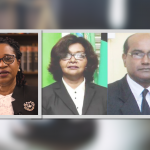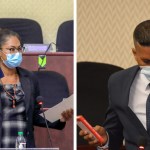
Prominent Guyanese-Canadian Attorney, Selwyn Pieters has written the Registrar of the Court of Appeal out of concern that statements by the Attorney General, Anil Nandlall, may be fueling attacks on the local Judiciary.
Pieters’ letter to the Appellate Court comes one day after the Attorney General chastised City Magistrate, Leron Daly after she upheld a no-case submission and discharged former Minister of Finance, Winston Jordan from the charge of misconduct in public office.
Jordan was accused of vesting title of a state land valued at over US$40M to a private company for which the State received US$100,000.
In a statement on Tuesday, Minister Nandlall said the Magistrate erred in law when she departed from the decision of the Chief Justice Roxane George, in the case Winston Brassington and Dr Ashni Singh v Commissioner of Police.
He said that such an “elementary egregious error” will inevitably shake the public confidence in the administration of justice.”
On his weekly televised programme, Issues in the News , the Attorney General again expressed his displeasure with the handling of the case.
“So, today in disregard of the Chief Justice’s ruling, and decision, which ought to have been binding on the learned Magistrate; the learned Magistrate ignored that and discharged Mr Jordan. How do you rationalize such a decision? Is it that different persons are judged in the judiciary or in the magistracy by different principles of law. These are identical cases, how can a government, how can the state, how can the public, how can a sitting Attorney General with responsibility for justice, not be critical of such a ruling?” the Attorney General said.
In his correspondence to the Court, Attorney Pieters said the statements issued by the Attorney General have subjected the judiciary to attacks including mobbing or cyberbullying on his Facebook page.
Providing the Court with evidence of the attacks, the Attorney pointed out that the Judiciary has been labelled as corrupted with some even calling for the Magistrate to face disciplinary action.
Pieters said this is the third time in recent times, that utterances of the Attorney General have led to such as attacks.
He also cited the response of the Attorney General to the ruling of Justice Gino Persaud in the case – PSC and Slowe v. Attorney General; and the recent ruling of Justice Sandil Kissoon in the case brought against the Environmental Protection Agency (EPA) and Esso.
But the Attorney General said the laws of Guyana do not bar Guyanese from fairly criticising the judiciary.
“We are required as citizens not to attribute ulterior or immoral motives to the judiciary and its officers. We are prohibited from launching scathing and scurrilous attacks against the judiciary and its officers, and I speak here, when I say judiciary and its officers, I include the magistrates. However, the law permits constructive and fair criticisms against the judiciary and its officers,” the Attorney General reason.
In his deliberations, he said the Rule of Law and the Doctrine of Separate of Powers insulate the judiciary from any form of influence, and mandate that it maintains independence in the execution and discharge of its functions.
“Our democracy and our constitutional system is based upon the doctrine of separation of powers, whereby the judiciary is responsible for the hearing and determination of all judicial matters, which includes criminal charges. It is the judiciary that determines how charges are heard, how they are determined. It is the judiciary that makes decision in relation to how these cases are conducted, and it is the judiciary that determines the outcome of these cases.”
The rule of law and the doctrine of separation of powers insulates and properly so, the judiciary from any form of influence whatsoever, and mandate that it is must be independent in the execution and discharge of its functions. And that independence we must all protect and preserve, because it is a central pillar to our constitutional structure and fundamental tenant of our democracy.
“We are required as citizens not to attribute ulterior or immoral motives to the judiciary and its officers. We are prohibited from launching scathing and scurrilous attacks against the judiciary and its officers, and I speak here, when I say judiciary and its officers, I include the magistrates. However, the law permits constructive and fair criticisms against the judiciary and its officers,” the Attorney General said.
But Pieters said while the Constitution guarantees Freedom of Speech, the line is drawn when such speech excites hostility and can serve to intimidate and intrude on the independence of the Judiciary.



















You must be logged in to post a comment Login